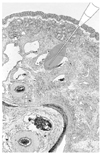Abstract
The prevalence of allergic rhinitis is nowadays increasing with industrial development. Patients with allergic rhinitis have symptoms such as nasal obstruction, watery rhinorrhea, sneezing and are frequently associated with sleep apnea, asthma and sinusitis. In patients with allergic rhinitis, conservative management including medical treatment, avoidance and immunotherapy are generally enough for controlling symptoms, but some patients refractory to conservative management need surgical management to improve nasal patency and decrease allergic response, which is inhibited by scarring of lamina propria after turbinate surgery. Surgical management include chemical cautery, laser cautery, cryotherapy, radiofrequency needle ablation, surgical resection of turbinate, vidian neurectomy and sinus surgery. Cautery of turbinate by laser and radiofrequency electrode is widely used because of its low morbidity and efficacy against vasomotor symptoms. Submucosal resection of turbinate and turbinopalsty improves nasal patency preserving mucociliary function. In addition, when it is combined with submucosal cautery, allergic response is inhibited more effectively. In conclusion, surgical management may be required for the treatment of allergic rhinitis which is refractory to conservative management or has anatomical abnormality.
References
1. Newacheck PW, Stoddard JJ. prevalence and impact of multiple childhood chronic illness. J Pediatr. 1994. 124:40–48.
3. Janda P, Sroka R, Tauber S, Baumgartner R, Grevers G, Leunig A. Diode laser treatment of hyperplastic inferior nasal turbinates. Lasers Surg Med. 2000. 27:129–139.

4. Bhargava KB, Shah TM. Treatment of allergic and vasomotor rhinitis by the local application of silver nitrate. J Laryngol Otol. 1980. 94:1025–1036.

5. Williams HO, Fisher EW, Golding-Wood DG. 'Two-stage turbinectomy': sequestration of the inferior turbinate following submucosal diathermy. J Laryngol Otol. 1991. 105:14–16.

6. Inouye T, Tanabe T, Nakanoboh M, Ogura M. Laser surgery for allergic and hypertrophic rhinitis. Ann Otol Rhinol Laryngol Suppl. 1999. 180:3–19.

7. Supiyaphun P, Aramwatanapong P, Kerekhanjanarong V, Sastarasadhit V. KTP laser inferior turbinoplasty : an alternative procedure to treat the nasal obstruction. Auris Nasus Larynx. 2003. 30:59–64.

8. Imamura SI, Honda H. carbon dioxide laser vaporization of the inferior turbinate for allergic rhinitis : short-term results. Ann Otol Rhinol Laryngol. 2003. 112:1043–1049.

9. Lin HC, Lin PW, Su CY, Chang HW. Radiofrequency for the treatment of allergic rhinitis refractory to medical therapy. Laryngoscope. 2003. 113:673–678.

10. Powell NB, Riley RW, Troell RJ, Blumen MB, Guilleminault C. Radiofrequency volumetric reduction of the tongue. A porcine pilot study for the treatment of obstructive sleep apnea syndrome. Chest. 1997. 111:1348–1355.
11. Smith TL, Smith JM. Electrosurgery in otolaryngology-head and neck surgery : principles, advances, and complications. Laryngoscope. 2001. 111:769–780.

12. Bumsted RM. Cryotherapy for chronic vasomotor rhinitis : technique and patient selection for improved results. Laryngoscope. 1984. 94:539–544.

14. Passali D, Lauriello M, Anselmi M, Bellussi L. Treatment of hypertrophy of the inferior turbinate : long-term results in 382 patients randomly assigned to therapy. Ann Otol Rhinol Laryngol. 1999. 108:569–575.

15. Ishida H, Yoshida T, Hasegawa T, Mohri M, Amatsu M. Submucous electrocautery following submucous resecrion of turbinate bone-a rationale of surgical treatment for allergic rhinitis. Auris Nasus Larynx. 2003. 30:147–152.

16. Golding-wood PH, Kent M. Vidian neurectomy : its results and complications. Laryngoscope. 1973. 83:1673–1683.




 PDF
PDF ePub
ePub Citation
Citation Print
Print




 XML Download
XML Download